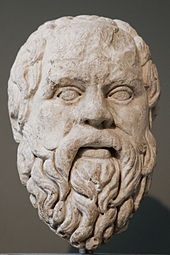|
|
| |
|
|
| |
|
|
|
|
| |
 |
| Socrates. |
Ethics
Ethics is the part of philosophy that deals with good
and evil. Ethics tries to answer questions like: |
- What actions are good? What actions
are evil?
- How can we tell the difference?
- Are good and evil the same?
- How should we make hard decisions
that might help or hurt other people?
- How do our actions affect others?
|
|
Ideas about ethics
When discussing ethics, the philosophy is generally
separated into: |
- thinking about morality,
- the involvement of science,
- the freedom of people to decide for
themselves how to act within their own beliefs.
|
|
Morality is what someone thinks or feels is good or bad.
There are many different moralities, but they share some
things. For example most people think that murder (killing
somebody) is wrong.(compare Exodus 20:13) Some philosophers
have hope to find more things that moralities share. They
think that ethics should use the scientific method to study
things that people think are good or bad. Their work can be
used to test the fairness of a situation, such as how people
should treat each other. An example of this kind of thinking
is the categorical imperative. Many countries have laws
based on this idea of fairness. |
|
What is ethics used for?
Understanding ethics can help people decide what to do
when they have choices. Many philosophers think that
doing anything or making any choice is a part of ethics.
Ethics is part of other fields of study in many ways.
Here are some ways: |
- Ethics is part of the study of
religion. In religion, people often learn what is good
or bad from what they believe about God (or gods). Some
important ideas about what is good or bad have come from
religion. See Ten Commandments.
- Some theories of economics say
ethics has to do with money. Money is a big part of most
people's lives. Thinking about morality can be important
in economics. For example, there is a saying about
ethics taken from the Bible that 'the love of money is
the root of all kinds of evil' (1 Timothy).The
philosophy of Marxism also says that a few people using
money in the wrong way can hurt many other people.
- Government policy can be affected by
what politicians think is ethical. Politicians try to
create laws that help everyone do what is right.
Political debates happen when the people who make public
policy do not agree about what is right.
- In work, thinking about ethics can
help with hard questions. Work can be like both
economics and politics. Workers have to make money and
follow laws. But the best way to do both is not always
easy to know. The study of this is called business
ethics.
- People like doctors and nurses have
to make hard choices about how to care for people.
Sometimes the person being cared for, their family or
the doctor do not agree what is best for them. Also,
choices have to be made if there is not enough money for
all people to get the help they need. The study of this
is called medical ethics
- Discussing ethics can also be a way
to stop people fighting or starting a war. By talking
about ethics, people hope to get what they want without
being violent. This works when all people agree that
peace is very important. But not everyone agrees about
what is right or wrong. So, sometimes anger can make it
hard to talk without fighting.
|
|
Along with aesthetics ethics forms part of axiology, the
philosophy of what people like. |
|
|
|
|
|
|
|
|
|
|
|
|
|
|
|
|
|
|
Search Fun Easy English |
|
|
|
|
|
|
|
|
|
|
|
|
|
|
|
About
Contact
Copyright
Resources
Site Map |